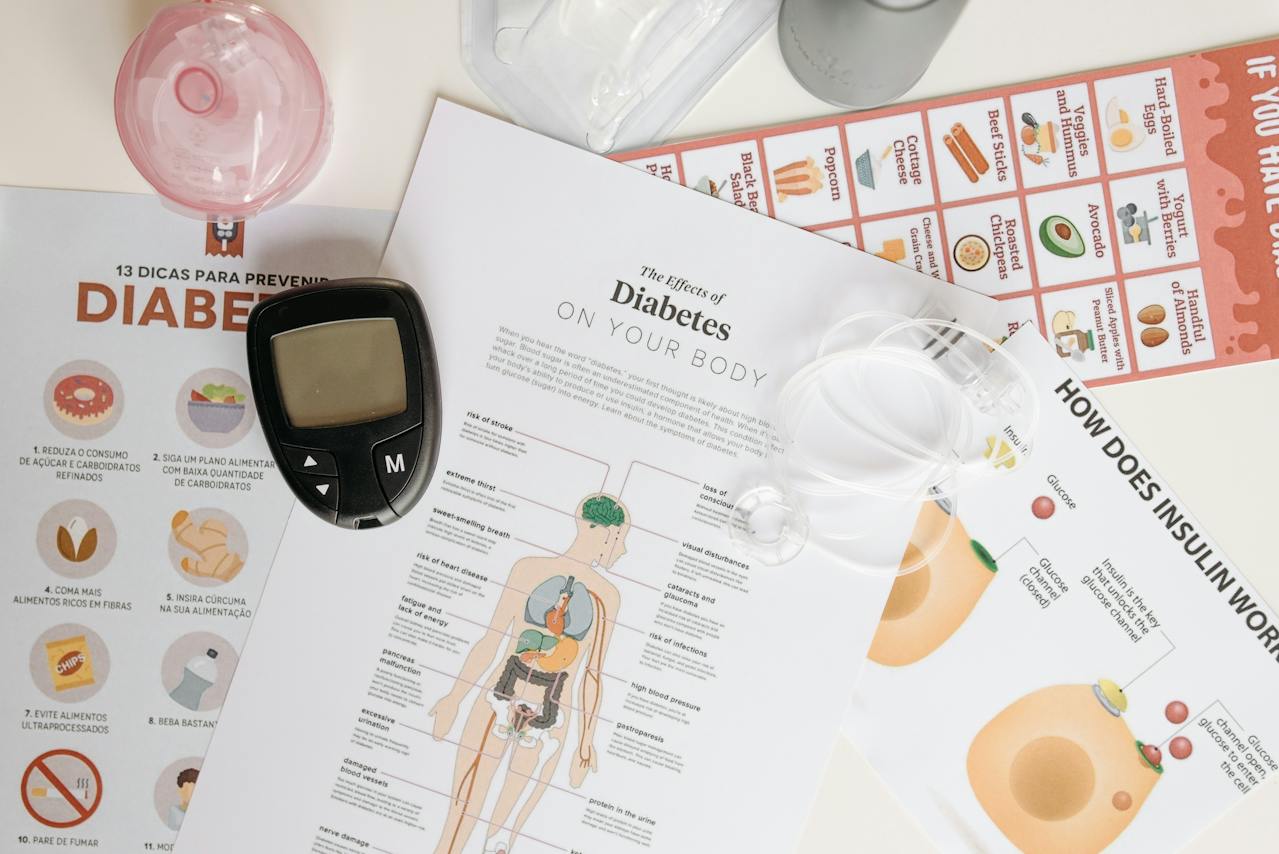As of 2021, it has been estimated there are approximately 38.4 million people with diabetes in U.S. population.[i] We often get questions about diabetes and if the diagnosis automatically disqualifies one’s candidacy for LASIK. Many patients will be happy to learn that the simplified answer is “NO”. However, there are additional clinical criteria that are required for a diabetic patient to qualify for LASIK.
What Is Diabetes?
Diabetes is a metabolic disease which causes a person’s blood glucose (or blood sugar) to become too high. A hormone called Insulin, made by the pancreas gland in the body, helps with the cellular transport of glucose from blood stream into cells where glucose can be properly utilized for energy. In the case of a diabetic patient, one’s body either makes little to no insulin or does not use insulin well. This leads to the accumulations of glucose and corresponding glycation end products in one’s blood stream.
As unutilized glucose molecules and the corresponding glycation end products accumulates, diabetes can damage any organ system in the body and lead to various health issues, including heart attack, stroke, nerve damages, kidney diseases, visual impairment and even blindness.
There is no cure for diabetes, but there are steps patients can take to manage their health.[ii] In addition to maintaining a healthy diet and active lifestyle, diabetic patients should consult their own diabetes managing physicians (ie, family doctors, endocrinologists) for proper treatments and learn how to reduce the risks of both systemic and ocular complications.

What Kind of Eye Problems Can Diabetes Cause?
The risks of diabetic ocular complications increase when the condition is not tightly controlled. It is generally recommended for diabetic patients to maintain blood sugar, blood pressure, cholesterol, and body weight at the clinical target levels prescribed by their own diabetic care physicians. Below are examples of ocular complications more commonly associated with diabetes[iii] :
Diabetic retinopathy – Retina is the inner tissue lining in the back of each eye that contains the light-sensing photoreceptor cells responsible in producing visual signals. Diabetes can weaken retinal blood vessels to cause bleeding, tissue swelling (diabetic macular edema) and subsequent visual deterioration that may or may not be reversible. If left untreated, prolonged inflammation and eventual cellular ischemia can result in permeant retinal damages and irreversible blindness
Cataract – The crystalline lens (“the lens”) inside of an eye acts like a magnifier to help focus images on to the retinal tissue where the photoreceptor cells are located. Cataract commonly refers to the occurrence when the lens becomes too cloudy to transmit sufficient light to the retina. In diabetic patients with poorly controlled blood sugar, not only can cataract occur at a younger age, it is also more likely for the lens to temporarily or permanently change its shape (due to tissue edema or swelling). This can lead to fluctuations in one’s vision and destabilize one’s prescriptions for glasses or contacts
Glaucoma – The visual signals produced by retinal photoreceptor cells in each eye are transmitted to the brain via the optic nerve pathway. Glaucoma threatens the health of the optic nerve cells and negatively impacts one’s vision and field of view. Diabetic patients have increased risks for glaucoma; if not detected and treated early, irreversible visual damages can occur
Can I have LASIK If I Have Diabetes?
FDA (The Food and Drug Administration) recommends diabetes to be considered as a relative contraindication for LASIK, which means diabetic patients may still qualify for LASIK pending how tightly controlled their diabetic conditions are. Since FDA initially made their recommended guidelines, there also has been more research demonstrating good LASIK safety and efficacy in diabetic patients who have tightly controlled blood sugar without evidences of both ocular complications and significant system complications.[iii], [iv]
Therefore, while having diabetes does not automatically disqualify a diabetic patient from LASIK surgery, it does mean that LASIK specialists have more clinical requirements to considered before determining if a diabetic patient can be a suitable LASIK candidate. In general, your LASIK specialist will assess the stability of glasses or contact lens prescriptions, your overall eye health and the current status of your diabetic conditions.
What are the factors to consider for LASIK eligibility as a diabetic?
First, your LASIK specialist will consider how long you have had diabetes. The longer you’ve had diabetes, the more risk there is for developing complications like diabetic retinopathy and fluctuating glasses or contact lens prescriptions.
Next, your LASIK specialist will examine your eyes, including a dilated retinal exam, to ensure eye health and rule out diabetic retinopathy, cataract and other diabetic eye diseases. A comprehensive eye exam is also important in determining the stability of your glasses or contact lens prescriptions. Keep in mind that LASIK surgery will offer the maximal long-term visual benefits only if your vision changes are unrelated to your diabetic condition.
Finally, your diabetes will have to be well managed in order to qualify for LASIK. This determination will at least include how well controlled your blood glucose has been in the last 6 to 12 months, which is why you will be asked to provide the lab results of your recent HbA1C (Hemoglobin A1C) tests. Your LASIK specialist may also wish to communicate with your diabetes managing physician(s) to ensure that your diabetic control is on target.
Does having Type 1 versus Type 2 diabetes affect my eligibility for LASIK?
No, it does not. There is no supporting data to correlate disparities in LASIK outcomes between Type 1 and Type 2 diabetic patients.iii Therefore, the same aforementioned pre-operative considerations will apply to both patient groups.
Does diabetes affect my recovery from LASIK surgery?
Diabetes is associated with delayed healing and thus has a higher theoretical risk of post-surgical infection. However, there are no large-scale studies to determine if this relationship of increased post-surgical infectious risk in diabetic patients can be extended to eye surgeries.[v] Additionally, due to advancements in LASIK surgical technologies, healing process after LASIK has also improved.
The shorter healing process of LASIK is especially advantageous when compared to the alternative laser refractive procedure called PRK, which requires a longer healing period. Thus, diabetic patients who qualify for laser vision correction surgery are often better suited for LASIK after factoring in their potentials for delayed healing.
Finally, dry eye is a potential side effect for all LASIK patients. Fortunately, this finding is often a temporary post-surgical event as majority of the LASIK patients are expected to return to their baseline presentations within the first 6 to 12 months.[vi] It has also been shown that dry eye incidence after LASIK has diminished given surgical advancements in LASIK.[vii] Nevertheless, given diabetic patients may experience delayed corneal healing, it is possible that dry eye symptoms after LASIK may be more severe in diabetic patients.
Often, dry eye can be managed by increasing the use of eye drops after the procedure and many medical treatment options for dry eyes also exist today. Diabetic patients are recommended to discuss this clinical consideration with their LASIK specialists and follow the post-operative instructions given.
When should I resume my diabetic eye exams after LASIK?
After enjoying clearer vision after your LASIK surgery, it is important to remember that your vision and overall eye health can still be affected if you don’t continue to manage diabetes. And your risk of developing systemic and/or ocular complications can still increase with the duration of disease. In addition to seeing your family doctor and/or internist for your regular diabetic exams, it is also recommended for you to have routine comprehensive eye exam with your eye doctors at least once a year.
An experienced LASIK provider and surgical team to individualize your LASIK procedure in order to achieve your best visual results. If you have diabetes, this tailored treatment planning process should include assessment of how well controlled your diabetes is as well as ensuring that your vision and overall eye health have not been affected by diabetes prior to LASIK.
__________________________
[i] American Diabetes Association. Statistics About Diabetes. https://diabetes.org/about-diabetes/statistics/about-diabetes.
[ii] National Institute of Diabetes and Digestive and Kidney Diseases (NIDDK). (2016). What is diabetes? Retrieved from https://www.niddk.nih.gov/health-information/diabetes/overview/what-is-diabetes
[iii] American Academy of Ophthalmology. (2015). LASIK in patients with diabetes. Retrieved from https://eyewiki.aao.org/LASIK_in_Patients_With_Diabetes_Mellitus#cite_note-one-1
[iv] Cobo-Soriano R, Beltrán J, Baviera J. LASIK outcomes in patients with underlying systemic contraindications: a preliminary study. Ophthalmology. 2006 Jul;113(7): 1118.e1-8.
[v] Ata A, Lee J, Bestle SL, Desemone J, Stain SC. Postoperative hyperglycemia and surgical site infection in general surgery patients. Arch Surg. 2010 Sep;145(9):858-64.
[vi] Shoja MR, Besharati MR. Dry eye after LASIK for myopia: Incidence and risk factors. Eur J Ophthalmol. 2007 Jan-Feb;17(1):1-6.
[vii] Salomão MQ, Ambrósio R Jr, Wilson SE. Dry eye associated with laser in situ keratomileusis: Mechanical microkeratome versus femtosecond laser. J Cataract Refract Surg. 2009 Oct;35(10):1756-60.
Categories:



